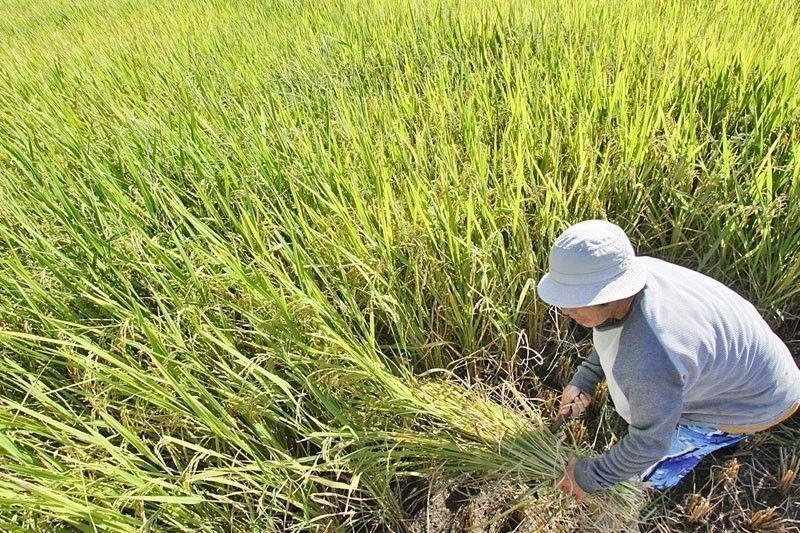Think tank urges making compensation for rice farmers a priority

MANILA, Philippines — Government think tank Philippine Institute for Development Studies said government efforts should be refocused on compensating farmers already adversely affected by the Rice Tariffication Law.
Roehlano Briones, PIDS senior research fellow and agricultural trade expert, said consumers would benefit more from the RTL in the long-term with an estimated P197 billion earned “every year for the first five years,” according to his analysis on 2019 data from the Philippine Statistics Authority.
In ten years, the top income group would gain some P367 billion, a stark contrast to the P87 billion earned by the bottom income group of consumers. He also said that within that time frame, “if we value all of those benefits and convert them as if we got them today, the equivalent value is P 2.26 trillion.”
The PIDS study found it would be palay farmers who would absorb the worst of the losses within the next five years.
He said that using data from before the law was implemented was not a good basis for measuring its effects as 2018 did not provide a sufficient picture of a "normal rice market" to begin with due to the gap between the highest and lowest palay prices shooting up to "almost 90 percent" for that year.
Economic sabotage
Republic Act 11203, or the Rice Liberalization Law, replaces restrictions on rice importation with tarrifs and aims to use the revenues to fund rice storage and research initiative programs under the Rice Competitiveness Enhancement Fund (RCEF) worth P10 billion a year.
Briones also warned that “imports over the decade will grow at about 29 percent” and would remain on pace to reach 52.8 percent under the law.
According to the US Department of Agriculture-Foreign Agricultural Service, the Philippines is already currently the world's top importer of rice, beating out China despite its population of more than a billion.
Lawmakers have called for the departments of Finance and Agriculture to release funds to assist the farmers adversely affected by the law. Farmer groups, too, say that their situation has not improved since the passage of the law due to depressed farmgate prices of palay, which they said has been "economic sabotage of the rice sector."
As of November 2019, the listed farmgate price of palay, or the price of palay purchased directly from farms, was P15.52 per kilogram, according to data from the Philippine Statistics Authority.
Farmers themselves say the actual costs, especially in far-flung areas, are as low as P7 per kilo, much lower than their production cost of around P12.
"[The law is] primarily triggering depressed farm gate prices as low as P7 per kilo this year, but the retail prices never dropped accordingly," Bantay Bigas spokesperson and Amihan Secretary-General Cathy Estavillo said in a December 9 statement.
As early as August, Estavillo and similar groups have been saying that the RCEF has only existed "[t]o show that there is government support to affected rice farmers."
Negative production growth
Although defending the logic of the law itself, Ateneo economics professor Ser Pena-Reyes, PhD in an earlier phone interview with Philstar.com also acknowledged that there were lapses in the aid extended to farmers as originally promised in the law.
"You’re going to gain revenues there which you should use to subsidize the farmers with. That needs to be implemented more forcefully [because] you also have to make sure that you support people who need it," Peña-Reyes said.
"We generate revenues from tariffs, [so] why don’t you help the farmers?"
The study by PIDS also showed that the production side would not fare that much better, either.
The think tank projected "-1.8-percent growth under the law versus a 2.5-percentage growth without tariffication" in ten years, while the five-year projection yielded a -5.7-percent growth rate with tariffication and a 2.8-percent growth without it.
Sen. Risa Hontiveros was also prompted in late December to urge the administration to include rice infrastructure initiatives in its Build, Build, Build program to ease strains and guarantee growth in the agriculture sector.
Even with the overwhelmingly negative results, though, Briones said that this should still not prompt the repeal of the Rice Tariffication Law, despite what the affected farmers in question have long been calling for.
“We do not deny the analysis [that] clearly points out the loss suffered by palay farmers. They actually have a point when they ask, ‘Why are we [going to] take a hit for the Filipino consumer?’ If the consumers really benefit, maybe they [rice farmers] can share in the benefit,” Briones said.
The researcher, though, urged that the government accelerate the rolling out of further RCEF funds.
Pena-Reyes, too, asserted that food security should be the broader goal rather than focusing on rice production and self-sufficiency. The professor echoed what economists have long been saying: that the lethal combination of low productivity and high production costs has always held the country's naturally-limited agriculture industry back.
"It’s not just rice that we should be focusing on," he said. “We’re not agronomically endowed to produce rice as much as Thailand and Vietnam do. They have the mighty Mekong River to serve as a natural source of irrigation. We do not have that."
By the year 2030, farmgate prices are seen to grow at only 0.8 percent under the law, in contrast to the projected 1.6 percent without it.
Retail prices, on the other hand, will shrink to the tune of a -1.7-percent growth by 2030 under the law, as opposed to 0.6 percent growth without tariffication.
For the farmers affected by this and who still remain without the substantial compensation recommended by the think tank, life is only getting harder.
- Latest
- Trending
































